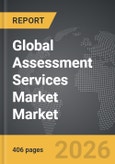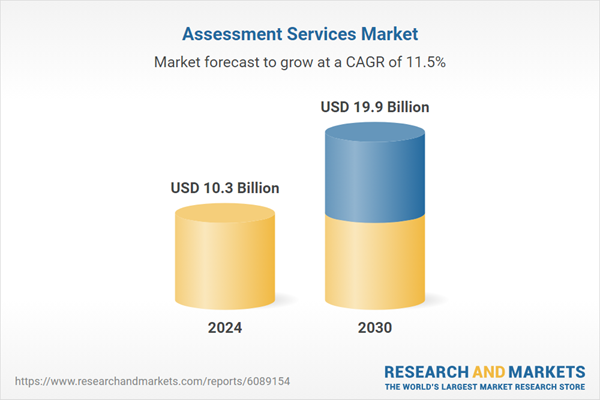Global Assessment Services Market - Key Trends & Drivers Summarized
Why Are Assessment Services Becoming Strategic Tools for Talent Development, Academic Evaluation, and Organizational Agility?
Assessment services have evolved from basic testing functions to strategic enablers of workforce readiness, educational accountability, and enterprise transformation. These services - ranging from psychometric tests and cognitive assessments to performance benchmarking and technical skill validation - play a critical role in recruitment, academic evaluation, upskilling, and certification. As global organizations prioritize data-driven decision-making and lifelong learning, assessment solutions are increasingly embedded into HR, education, and training ecosystems to ensure precision, scalability, and fairness.In corporate settings, assessment tools are central to talent acquisition, employee development, and succession planning. Employers use pre-employment testing to evaluate cognitive abilities, personality traits, domain-specific skills, and job fit - improving hiring accuracy and reducing attrition. Post-hire assessments support personalized learning pathways, leadership identification, and internal mobility. With the growing focus on skills-based hiring, standardized assessments are also being used to decouple credentials from capabilities, particularly in fast-evolving sectors like tech, healthcare, and finance.
In education, assessment services facilitate standardized testing, adaptive learning, and academic diagnostics across K-12, higher education, and certification bodies. Digital assessments enable institutions to track student progress, validate curriculum effectiveness, and personalize instruction. Government agencies use assessments for large-scale testing in national education systems, while credentialing organizations deploy high-stakes exams for professional licensing. The convergence of remote proctoring, AI-based evaluation, and competency frameworks is redefining how learning outcomes are measured, verified, and reported globally.
How Are Digital Platforms, AI-Driven Insights, and Remote Proctoring Technologies Enhancing Assessment Delivery?
The digitization of assessment services is transforming user experience, operational efficiency, and data accuracy. Online testing platforms support scalable, flexible, and secure assessment delivery across geographies, devices, and formats. These platforms offer real-time analytics, auto-grading, and seamless integration with learning management systems (LMS) or applicant tracking systems (ATS), enabling end-to-end visibility across candidate and learner lifecycles. Cloud-based delivery also ensures high availability and resilience - key requirements for high-volume or high-stakes testing environments.Artificial Intelligence (AI) is being deployed across multiple layers of the assessment lifecycle. AI-based test design tools generate adaptive questions that adjust to candidate proficiency, enhancing accuracy and reducing bias. Natural language processing (NLP) engines are used to evaluate open-ended responses and communication skills, while machine learning models generate performance insights, benchmark comparisons, and predictive analytics. These insights support informed decision-making in hiring, promotion, training investment, and academic intervention strategies.
Remote proctoring has emerged as a pivotal enabler of secure, scalable assessments in remote and hybrid settings. Technologies such as facial recognition, browser lockdown, keystroke dynamics, and live invigilation help authenticate test-takers and deter misconduct - maintaining test integrity outside traditional exam centers. This capability is expanding access to certifications, academic qualifications, and recruitment assessments globally, particularly for distance learners, gig workers, and candidates in underserved regions. As security expectations rise, multimodal proctoring combining AI surveillance and human review is becoming standard in high-stakes testing scenarios.
Which End-Use Markets and Regional Segments Are Driving Demand for Assessment Services?
Corporate sectors - especially IT, BFSI, healthcare, and professional services - are leading adopters of assessment services to optimize hiring, improve workforce performance, and support compliance training. With the acceleration of digital transformation, companies are shifting from degree-based hiring to skills-first evaluation models. This trend is creating demand for coding tests, role-based simulations, behavioral assessments, and virtual assessment centers that support remote hiring and rapid talent deployment.The academic segment continues to be a robust growth area, with demand driven by K-12 school assessments, university admissions testing, and credentialing programs. Education ministries and examination boards are digitizing standardized tests to reduce costs, improve accessibility, and generate actionable learning insights. EdTech platforms are incorporating embedded assessments into microlearning modules, while certification providers are expanding their reach via on-demand, remotely proctored qualification exams.
Geographically, North America and Western Europe dominate the market, driven by digital readiness, strong corporate L&D investments, and mature education systems. Asia-Pacific is witnessing fast-paced growth, particularly in India, China, and Southeast Asia, where large student populations, workforce skilling initiatives, and test preparation industries are fueling demand. The Middle East, Africa, and Latin America are emerging markets for digital assessments, supported by government digitization programs, transnational education partnerships, and mobile-first testing models that bridge infrastructure gaps.
How Are Compliance, Personalization, and Outcome Measurement Shaping Assessment Services Strategy?
Data security, fairness, and regulatory compliance are central to the deployment of digital assessment tools - especially in contexts involving sensitive academic or employee information. Providers are aligning with standards such as GDPR, SOC 2, and ISO certifications, while also developing bias-mitigation techniques, accessible testing interfaces, and inclusive question banks. Transparency in scoring, test design, and accommodations is becoming a strategic priority to maintain stakeholder trust and institutional credibility.Personalization is another key growth driver, with platforms offering adaptive testing, modular assessments, and role-specific benchmarking to tailor evaluations to individual profiles and learning goals. AI and analytics tools segment performance by skill clusters, behavioral traits, and response patterns - enabling organizations and educators to create targeted development plans. Gamified assessments and scenario-based simulations are also gaining traction as engaging formats that improve participation and realism.
Outcome measurement is becoming increasingly sophisticated, with stakeholders demanding actionable insights beyond raw scores. Dashboards now offer real-time analytics on skill gaps, learning progress, readiness indices, and predictive outcomes. In workforce contexts, these insights feed into reskilling strategies, career pathing, and performance reviews. In education, they support early intervention, curriculum design, and institutional accreditation. As the focus shifts from assessment-as-an-event to assessment-as-a-service, data-driven feedback loops are redefining the strategic value of evaluation systems.
What Are the Factors Driving Growth in the Assessment Services Market?
The assessment services market is expanding rapidly, propelled by digitization, skills-based economies, and the need for continuous, data-informed evaluation in education and workforce development. Organizations across sectors are turning to assessments not just for screening or grading - but as integral tools for personalizing learning, driving accountability, and shaping future-ready talent strategies.Key growth drivers include the rise of remote work and learning, demand for scalable certification models, evolving recruitment paradigms, and government-supported skilling initiatives. The integration of AI, analytics, and cloud platforms is enabling richer insights, real-time adaptability, and cost-effective delivery across global and decentralized user bases.
Looking ahead, the success of the assessment services market will hinge on how well providers balance integrity, personalization, and interoperability while delivering value across dynamic learning and labor ecosystems. As education and employment models converge around capability validation, could intelligent assessment platforms become the backbone of lifelong, performance-driven development?
Report Scope
The report analyzes the Assessment Services market, presented in terms of market value (US$). The analysis covers the key segments and geographic regions outlined below:- Segments: Assessment Type (Aptitude Tests, Personality Tests, Skill Tests, Behavioral Assessments, Psychometric Assessments, Career Assessments, Leadership Assessments, Other Assessment Types); Deployment (Online Assessment Platforms, In-Person Assessments, Blended); Vertical (Information Technology, Healthcare & Life Sciences, BFSI, Manufacturing, Retail, Education, Government & Public Sector, Other Verticals).
- Geographic Regions/Countries: World; United States; Canada; Japan; China; Europe (France; Germany; Italy; United Kingdom; Spain; Russia; and Rest of Europe); Asia-Pacific (Australia; India; South Korea; and Rest of Asia-Pacific); Latin America (Argentina; Brazil; Mexico; and Rest of Latin America); Middle East (Iran; Israel; Saudi Arabia; United Arab Emirates; and Rest of Middle East); and Africa.
Key Insights:
- Market Growth: Understand the significant growth trajectory of the Aptitude Tests segment, which is expected to reach US$5.3 Billion by 2030 with a CAGR of a 13.8%. The Personality Tests segment is also set to grow at 13.2% CAGR over the analysis period.
- Regional Analysis: Gain insights into the U.S. market, valued at $2.8 Billion in 2024, and China, forecasted to grow at an impressive 15.9% CAGR to reach $4.2 Billion by 2030. Discover growth trends in other key regions, including Japan, Canada, Germany, and the Asia-Pacific.
Why You Should Buy This Report:
- Detailed Market Analysis: Access a thorough analysis of the Global Assessment Services Market, covering all major geographic regions and market segments.
- Competitive Insights: Get an overview of the competitive landscape, including the market presence of major players across different geographies.
- Future Trends and Drivers: Understand the key trends and drivers shaping the future of the Global Assessment Services Market.
- Actionable Insights: Benefit from actionable insights that can help you identify new revenue opportunities and make strategic business decisions.
Key Questions Answered:
- How is the Global Assessment Services Market expected to evolve by 2030?
- What are the main drivers and restraints affecting the market?
- Which market segments will grow the most over the forecast period?
- How will market shares for different regions and segments change by 2030?
- Who are the leading players in the market, and what are their prospects?
Report Features:
- Comprehensive Market Data: Independent analysis of annual sales and market forecasts in US$ Million from 2024 to 2030.
- In-Depth Regional Analysis: Detailed insights into key markets, including the U.S., China, Japan, Canada, Europe, Asia-Pacific, Latin America, Middle East, and Africa.
- Complimentary Updates: Receive free report updates for one year to keep you informed of the latest market developments.
Some of the 43 companies featured in this Assessment Services market report include:
- AIIR Consulting
- AON
- Australian Council for Educational Research (ACER)
- Bureau Veritas
- Center for Creative Leadership (CCL)
- Cognizant
- Competitive Edge
- CPS HR Consulting
- Deloitte
- Development Dimensions International (DDI)
- Eleserv
- Gallup
- Gallup
- Hogan Assessments
- IBM
- Kaplan, Inc.
- Korn Ferry
- Mercer
- Mettl
- National Business Research Institute
This edition integrates the latest global trade and economic shifts into comprehensive market analysis. Key updates include:
- Tariff and Trade Impact: Insights into global tariff negotiations across 180+ countries, with analysis of supply chain turbulence, sourcing disruptions, and geographic realignment. Special focus on 2025 as a pivotal year for trade tensions, including updated perspectives on the Trump-era tariffs.
- Adjusted Forecasts and Analytics: Revised global and regional market forecasts through 2030, incorporating tariff effects, economic uncertainty, and structural changes in globalization. Includes historical analysis from 2015 to 2023.
- Strategic Market Dynamics: Evaluation of revised market prospects, regional outlooks, and key economic indicators such as population and urbanization trends.
- Innovation & Technology Trends: Latest developments in product and process innovation, emerging technologies, and key industry drivers shaping the competitive landscape.
- Competitive Intelligence: Updated global market share estimates for 2025, competitive positioning of major players (Strong/Active/Niche/Trivial), and refined focus on leading global brands and core players.
- Expert Insight & Commentary: Strategic analysis from economists, trade experts, and domain specialists to contextualize market shifts and identify emerging opportunities.
Table of Contents
Companies Mentioned (Partial List)
A selection of companies mentioned in this report includes, but is not limited to:
- AIIR Consulting
- AON
- Australian Council for Educational Research (ACER)
- Bureau Veritas
- Center for Creative Leadership (CCL)
- Cognizant
- Competitive Edge
- CPS HR Consulting
- Deloitte
- Development Dimensions International (DDI)
- Eleserv
- Gallup
- Gallup
- Hogan Assessments
- IBM
- Kaplan, Inc.
- Korn Ferry
- Mercer
- Mettl
- National Business Research Institute
Table Information
| Report Attribute | Details |
|---|---|
| No. of Pages | 406 |
| Published | February 2026 |
| Forecast Period | 2024 - 2030 |
| Estimated Market Value ( USD | $ 10.3 Billion |
| Forecasted Market Value ( USD | $ 19.9 Billion |
| Compound Annual Growth Rate | 11.5% |
| Regions Covered | Global |









